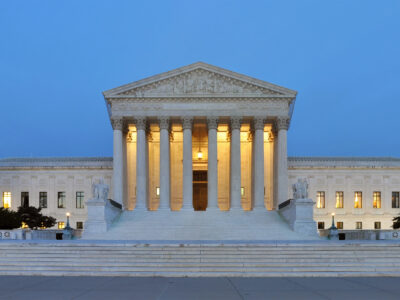A Strange Taking Case for the 2012 Term

Rick notes that the Supremes have decided to revisit Takings jurisprudence in a couple of cases this term. One of them, Koontz v. St. Johns River Water Management District, involves an important legal issue, but the factual issues seem quite strange.
The Supremes granted cert in Koontz to consider two questions: 1) can a property owner bring a Takings claim based upon its refusal to accede to demanded exactions (as opposed to submitting to them and then bringing a case); and 2) does the Nollan/Dolan heightened scrutiny that applies to exactions of real property also apply to exactions of money?
Both of these questions raise interesting issues, but at this point, the strange thing is that the District denies that the factual predicate for either of them ever took place. First, it says that it never insisted on any particular exaction; it simply proposed them, invited the property owner to submit a counter-offer, and the property owner refused to do so. Second, it says that it never required money in exchange for the permit to fill wetlands. It thus argues in its cert brief that for the Court to rule on either would be an advisory opinion.
Obviously Koontz himself disagrees, and points to a trial court finding that the District did in fact insist on money and did in fact make a final order. But perhaps because of space limitations in its brief, it does not point to anything in the record demonstrating this. This would hardly be the first time that a major Takings case has come from an obscure trial court ruling: the famous case of Lucas v. South Carolina Coastal Comm’n rested on a patently strange and unsupported trial court assertion that the state’s regulation had rendered the plaintiff’s property worthless.
As to the substance:
On the issue of money, petitioners are asking the Supremes in effect to nationalize the California Supreme Court’s holding in Ehrlich v. City of Culver City, which held that monetary exactions are analyzed under Nollan and Dolan. I believe that Nollan was wrongly decided, but Dolan seems to me obviously correct. In any event, those worried about the expansion of Takings liability should not fret here: Ehrlich has hardly hamstrung governments. There are interesting theoretical issues about the distinction between fees and real property exactions, but as a practical matter, I do not see the outcome here as substantially altering the balance of power between the property owner and the government. Indeed, as Ann and Daniel Pollack found, in the wake of Ehrlich, many governments started actually to analyze the impacts of many development projects and raised their fees.
The “failed exaction” issue is a little trickier because it is not quite clear what it means. It seems to me like a distinction without a difference to argue that a property owner can bring a claim only after submitting to an exaction demand. Rather, at least from the facts as they are presented in the parties’ petitions for and against cert, this appears to be a sort of garden-variety ripeness case stemming not from Nollan or Dolan, but rather from Williamson County Regional Planning Comm’n v. Hamilton Bank. According to the District, it rejected Koontz’ original plan without the mitigation measures; Koontz replies that he tried for 11 years to get a permit, to no avail. That makes it a ripeness case. The Supreme Court has not had success ruling on ripeness issues, mainly because they are so fact-intensive as to make broad pronouncements virtually impossible. Its last attempt, in Palazzolo v. Rhode Island, “solved” the ripeness question by claiming that the state had failed to raise it earlier and had thus waived the argument — which solves exactly nothing.
In all, then, as Takings cases in the Supreme Court go, this one does not seem to be a blockbuster. I’m generally pretty skeptical of Takings claims, but asking the District to justify its fee does not seem to be that much to ask, although I could be persuaded otherwise.







Reader Comments